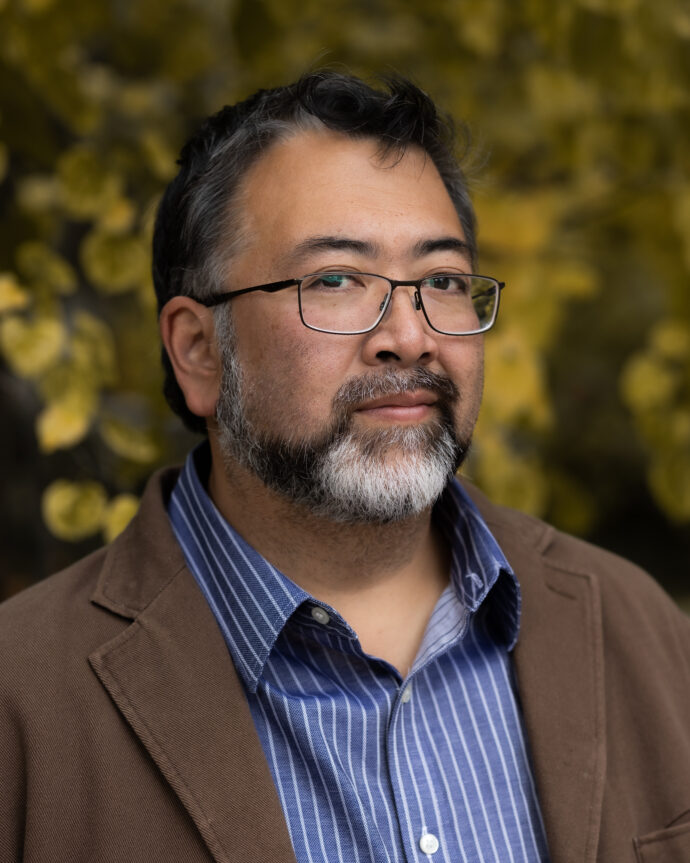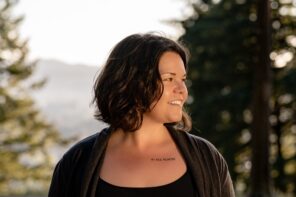My wife Deedra waves her hands at the other end of the Delaware County Public Library to get my attention. It isn’t an easy task. I am lost in the wonder of books. My eyes scan kaleidoscopic book spines, absorb the names of authors, and take in the titles of travel guides promising adventures in South Africa and Scotland and Singapore. When I finally notice Deedra, I am diving into the deep blue of the Mediterranean Sea, the density of the salt water bolstering my body afloat. The air in my imagination is filled with the sweetness of figs.
So it takes me a moment to register her, a moment to notice her glowering face, her wrinkled brow, her glaring eyes, her urgently moving mouth. She is not mouthing, I love you, my darling, or You are the best husband ever, or You look dashing over there in your sweatpants and coffee-stained hoodie. Deedra does not say any of that. Instead, her mouth forms the words: Get over here now.
We are at the library this morning for a cub scout outing. Deedra is the Den Leader, and today’s field trip is so the scouts in her pack can each make a family tree. The pack—five boys—sits at a table in a room in the furthest corner of the library. They look tired. Probably bored. Some have their mouths open, in a daze. Some, like my son, can’t keep still, shifting up and down in their chairs. They are a bunch of six and seven-year-olds, after all, a bunch of six and seven-year-olds, listening, or trying to listen, or not listening at all to two smiley women in their seventies talking about genealogy. The women talk with a pride that is reflected in the ‘Local History Room’ we are in. Old Ohio maps, black and white photos of working farmers and the construction of the town hall hang on the walls. The room is dark wood, the stale smell of old paper in the air. The boys are polite—no one talking, no one pulling on each other’s hair or nose or the scout scarves around their necks. No one is climbing on me like a jungle gym, as they are apt to do at the den meetings at our house. The women give instructions on how to fill out the worksheet in front of them. On it is a tree and blank spaces to enter names on branches.
“Hi, Dad,” Bodhi says. His cub scout hat is crooked. The remnants of whatever chocolate he ate in the morning stains his right cheek.
“What do you have here, bud?”
“A family tree.”
On the right side of his worksheet, Bodhi has already filled out the names on his mother’s side of the family. On his father’s side, however, most of the blanks remain empty, except for his grandmother’s name, Ya-Ya, which isn’t her name at all; just what he calls her.
“Can you help me?” he says.
“To the best of my ability.”
The other boys are hard at work. Their parents lean over them. They tell them what names go on what branches. Deedra moves around the room to see if anyone needs a pencil. One of the women says how important it is to know where you come from, how important it is to preserve history.
“What was your dad’s name?” Bodhi says.
“Montri.” I spell it out for him.
He writes one slow letter at a time. His letters are large and go over the allotted space.
“The curse of Thai names,” I say out loud to no one in particular. “Too long to fit.”
No one reacts. I don’t know why I expected someone to.
Bodhi rolls his eyes. “I know, Dad.” Moments like this I think he is sixteen and not six. “What is Ya-Ya’s mom and dad’s name?”
I don’t know. I don’t know much about them. Only that my grandmother died when my mother was a teenager. Only that she gave birth to nine kids, my mother the third oldest. Only that there is a picture of her in my mother’s bedroom in Chiang Mai, Thailand, face young and full, like my mother but rounder and without freckles. And my grandfather—he died when I was three. Lung cancer. A photo of me in his lap exists in a frayed album, which is proof I met him once, but I don’t remember anything about him.
“I met your great-grandfather once,” I say.
“I know, Dad,” Bodhi says. “You told me already.”
I did tell him. I tell him lots of things. I am the Teller of Things. I think many fathers are the Tellers of Things.
“Names?” Bodhi says.
I make them up—easy and quick. Making things up is what I’ve been doing most of my life.
He scrawls down each letter I give him, pressing hard on the paper.
“What about this side?” Bodhi points the pencil at the branches on my father’s side of the tree. He may as well have just pointed at an impenetrable shadow, so dense and black it is like being swallowed.
“I don’t know,” I say.
“You don’t know?” Deedra is behind us, looking over Bodhi’s work.
“I don’t know.”
“Anything?” She’s puzzled. We’ve been married for six years, and it surprises her the things she doesn’t know that I don’t know about my life.
“Anything.”
Bodhi cranes his neck to look at us. The other scouts look, too. And their parents.
“The mystery of fathers.” I shrug.
Some fathers nod.
“He never told you anything?” Deedra says.
“Nothing.”
That’s not true. My father told me something. He told me the story of how he learned to swim. How his mother threw him into the river and walked away. How piranhas bit off tiny chunks of his legs. How he almost died. What Bodhi knows of his grandfather are the piranhas and that he died the summer he turned one.
“My dad was poor,” I say. “Really poor. He never spoke about his parents.”
“Only piranhas,” Bodhi says.
I squeeze the back of his neck, like how my father used to.
“We have computers,” one of the ladies says. “Maybe we can find out more.”
“Maybe,” Bodhi says.
“Maybe,” I say.
The scouts move like a paddling of ducks to the computer lab. On the computer screen is a simple database where we fill out the names of the individuals we want to find. The women tell us there can be spelling variations of the last name, which was frequent, especially for those who came to America through Ellis Island.
Bodhi pecks the keyboard with his index finger. S-U-K-R-U-N-G…. When he presses enter, my name appears on the screen. “That’s you.”
“That’s me.
I tell him to type Ya-Ya’s last name. He pecks V-A-C-H-A…. When he presses enter, nothing emerges.
“Try adding the year they were born,” one woman says.
“Add the country they were born in,” says the other.
Bodhi does, but nothing comes up. We are throwing coins into a bottomless well.
When Bodhi enters Deedra’s family’s information, a long list materializes. So many names. So many relatives. Deedra tells Bodhi who they are. “That’s your great-grandfather. That’s your great-grandmother. Here’s your great-uncle. All of them lived in Colorado. Many still do.”
Bodhi is a listener. An observer. He takes everything in. Already, at six, he watches the world to find his place in it. And though he is attentive, I can tell by the way he glances at the empty spaces on his tree he wants to know more about his Thai side. Deedra and I want him to understand where he comes from, how he is a merging of cultures. Two sides in one beautiful boy. One side has long been in this country, the ‘white’ side we jokingly call it; and the other half hails across an ocean in a land centuries old, of kingdoms and dynasties, of mighty elephants and prideful kings, a place where mosquitoes hum in the ear and the sun scorches the land. A land of stories and lore, some I’ve learned, but most I’ve made up like my grandparents’ names. Creating a history of lineage and ancestry, creating a saga of how I came to be.
This is what they don’t tell you about immigrant children. We are born from bits of story and imagination. This is what they don’t tell you about the loneliness of immigrant children. It begins before we are born. Before we are even a thought.
Afterwards, Bodhi and I travel the stacks. Like me, Bodhi loves books. He takes one off the shelf, reads the first page, and then puts it back. I follow him. Watch him. Tell him he’s a good reader. “I know, Dad.” Eventually, he picks out a book about Japan and takes it to a table to read. “I’m Japanese,” he says and smiles. It’s our running joke, his obsession with all things Japan—anime, Pokémon, ramen. He says he’s Korean, too, for his love of Tae Kwon Do and BTS. He reads out loud—about shrines and temples and Mt. Fuji. Small windows near the ceiling of the library let in slivers of light. We sit in one, warmed by the glow.
Bodhi’s curiosity about who he is grows by the day. He wants to know about the different tint of his skin. He wants to know about his eyes that thin at the corners. He wants to know about Buddha, whose image resides in most of the rooms in the house. He wants to know about his Ya-Ya, a woman he loves dearly but sometimes doesn’t understand. He wants to know about those he hasn’t yet met and those he never will. There is a fine line between knowing and not knowing.
My family tree is a tree without names. My family tree is not comprised of branches or limbs, but rather empty spaces between quivering leaves. My family tree is Bodhi, my son, who we named after the tree Buddha sat under when he gained enlightenment, a tree that expands and expands and expands, ever growing.
Above it, light. Below it, shade.
Ira Sukrungruang was born in Chicago to Thai immigrants. He earned his BA in English from Southern Illinois University Carbondale, and his MFA from The Ohio State University. He is the author of four nonfiction books This Jade World (2021), Buddha’s Dog & Other Meditations (2018), Southside Buddhist (2014) and Talk Thai: The Adventures of Buddhist Boy (2010), the short story collection The Melting Season (2016), and the poetry collection In Thailand It Is Night (2013). You can find out more about him and his work at buddhistboy.com.



